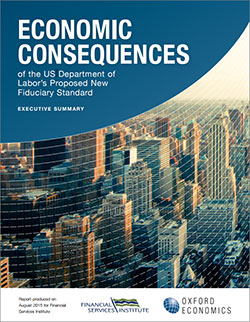Ungated Post | 18 Aug 2015
The economic consequences of the US Department of Labor’s proposed new fiduciary standard

This study focuses on the economic impact of the Department of Labor’s (DOL) proposed fiduciary rule for retirement advice on the independent financial services industry and investors who rely on independent advice. It estimates the DOL’s proposed rule will cost the independent financial services industry and investors nearly $3.9 billion in total startup costs to implement the rule – nearly 20 times DOL’s preferred cost estimate—and suggests that, if the rule is implemented, only high net-worth investors will be able to access and afford professional retirement investment advice.
About the Financial Services Institute
The Financial Services Institute (FSI) was founded in 2004 with a clear mission: to ensure that all individuals have access to competent and affordable financial advice, products and services delivered by a growing network of independent financial advisors and independent financial services firms. To find out more, please visit: www.financialservices.com.
Oxford Economics’ team is expert at applying advanced economic tools that provide valuable insights into today’s most pressing business, financial, and policy issues.
To find out more about our capabilities, contact:
Americas
Diantha Redd
+1 (646) 503 3052
Email
Asia Pacific
Peter Suomi
+65 6850 0110
Email
EMEA
Aoife Pearson
+44 (0)203 910 8054
Email
Related Services

Post
The economic impact of abandoning the WTO
Oxford Economics have been commissioned by the International Chamber of Commerce (ICC) to provide an independent assessment of the economic impact of WTO dissolution. This report details our findings and the assumptions underpinning our analysis.
Find Out More
Post
The economic impact of the sports activities of public service media
This study shows how the sports activities of public service media supported €4.5 billion of GDP and 57,000 jobs across 31 European countries in 2022. The report also highlights wider economic benefits of public service media sports coverage, such as the way in which it leverages sponsorship income for sports bodies.
Find Out More
Post
Global Trade Education: The role of private philanthropy
Global trade can amplify economic development and poverty alleviation. Capable leaders are required to put in place enabling conditions for trade, but currently these skills are underprovided in developing countries. For philanthropists, investing in trade leadership talent through graduate-level scholarships is an opportunity to make meaningful contributions that can multiply and sustain global economic development.
Find Out More